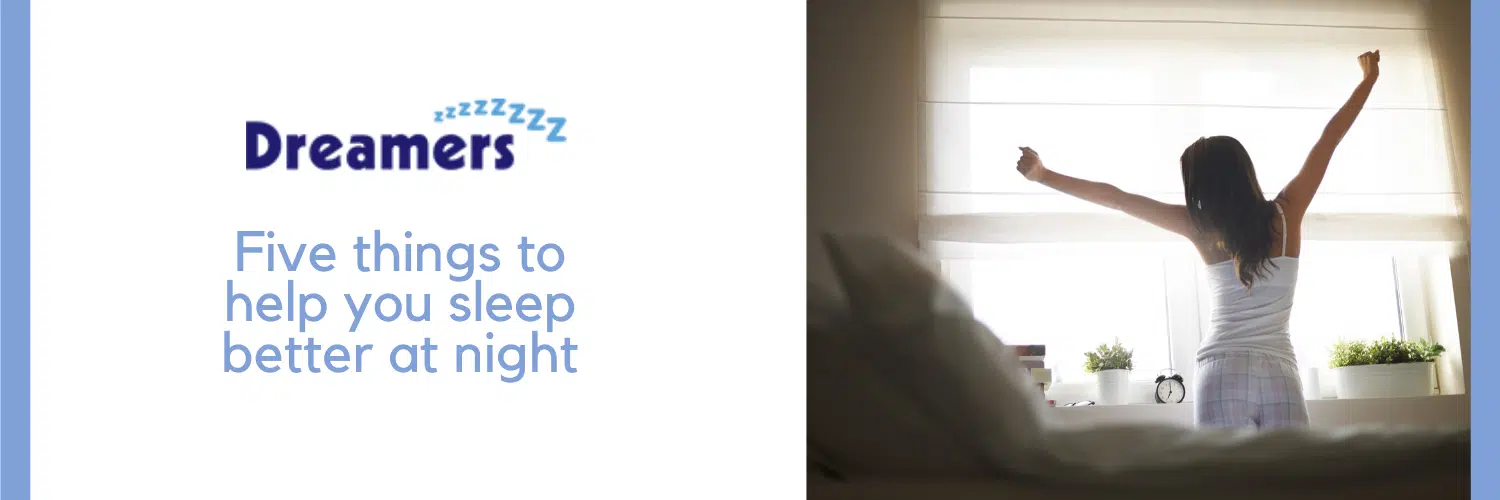Five things to help you sleep better at night
Do you have trouble drifting off to sleep at night? Perhaps getting to sleep isn’t the problem, but you struggle with regularly waking up? If so, you’re not alone – in fact, approximately two thirds of adults in the UK...

Do you have trouble drifting off to sleep at night? Perhaps getting to sleep isn’t the problem, but you struggle with regularly waking up? If so, you’re not alone – in fact, approximately two thirds of adults in the UK suffer from disrupted sleep.
Here at Dreamers, we consider ourselves experts in getting a great night’s sleep, and whilst the right bed is a huge part of that, there are other things you can do which can help you knock out the Zs before you know it.
So, whether you’re a restless sleeper or simply looking for helpful advice, here are our five DIY tips that you can try the next time sleep is evading you!
1. Find a consistent routine that works for you
There is such a huge amount of emphasis on getting 8 hours of sleep every night and going to bed early in order to rise early. However, this routine may not be suitable for your day-to-day routine, and if that’s the case, you could find yourself struggling to get adequate rest.
The most important point to remember is that each and every one of us is different and requires different things in order to thrive. Whilst 8 hours of sleep for one person may be just the right amount, for you, it may be nowhere near enough, or far too much! Anything from your work schedule to your activity levels can impact how much sleep your body needs, and when – so step one is not to put pressure on the “traditional” sleep routine.
It may take a few weeks, but work to find the right sleep routine that works well for you, your schedule and your responsibilities. The more consistent you can be with your sleep pattern, the more successful you’re likely to be – so although it may take a bit of trial and error, this one is really important!
2. Set the mood
Mood lighting is a great way to tell your mind and body that it is time to wind down and switch off. Bright lights, or blue lighting found on mobile phones and laptops, keep the brain stimulated, making sleep much more difficult.
Where possible, we advise you to put down your electronic devices at least 20 minutes before you plan to go to sleep, but ideally 1 hour before. Dim the lights or opt for candles that offer a more therapeutic and calming atmosphere and let your mind slow down.
It may sound simple – but studies have shown that lighting, such as blue lights, have a direct impact on the sleep hormone melatonin, and the less lighting of this kind can mean more melatonin is produced, and more sleep can occur!
3. Limit the time spent in bed
It can be all too tempting to have a lie in, or head to bed in advance of sleep to watch TV or read, but this could be having an impact on the quality of your rest! Typically, we advise to limit the amount of time you spend in bed to just when you intend on going to sleep, which should help your brain to know exactly when it’s time to switch off for the night.
This is also true for those who get to work from home. The draw of the bed may be almost too much to resist, but if you only use it for sleeping, you will find that your nights become a little less interrupted.
A great way to avoid climbing into the comfort of your bed too soon is to make it as soon as you get up. Nobody wants to undo a freshly made bed, so this should work as a good deterrent when you’re feeling weak willed!
4. Have a change of scenery
If you’ve been struggling with your sleep for some time, it may feel like nothing is working and this can have a direct impact on other areas of your life. If this sounds familiar, you may find that a change of scenery is just what you needed to combat the issue.
This doesn’t necessarily have to mean a full renovation of your bedroom! In fact, just some simple changes can have a positive impact on your mentality and help you to sleep. Why not consider rearranging the furniture you already have? Swap out your bedside lamps for the ones from your guest room, change the bedding and introduce some soft furnishings that can help change-up the feel of your room without requiring much effort or money.
5. Reduce fluid intake in the evenings
Although not the case for everyone, for many a potentially good night’s sleep is prevented due to frequent bladder interruptions. Although this may be unavoidable for some, for many of us simply reducing the amount of liquid we consume in the evenings can be the difference between a full night of sleep and one that is fraught with regular disruption.
Avoid caffeine and alcohol and aim to drink your last drink at least an hour before going to bed in order to keep night time toilet breaks to a minimum.
Is your bed the issue?
If you’re struggling to sleep well at night and suffer from frequent aches and pains – then the issue may be your mattress. Luckily, here at Dreamers we offer a huge range of mattress and bed types to suit all needs. So, if you’re looking for the perfect bed to help you sleep, why not take a look at our collection?
Struggling to know what type of mattress will work best for uninterrupted sleep? Check out our blog on finding the perfect mattress for you, or give us a call today and one of our team will be happy to help!

